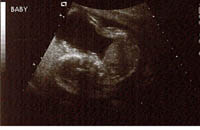Report suggests foetuses feel no pain
A report in the British Medical Journal suggests that foetuses cannot feel pain, and that the ability to feel pain can only be developed once a baby has been born. The research, conducted by psychologist Dr Stuart Derbyshire from the University of Birmingham in the UK, re-opens a part of abortion debate - as to whether the foetus can feel pain. When mothers are given abortions, they are generally told that the foetus does not feel pain, but this has been disputed by anti-abortion campaigners. While abortion is legal in most EU states, this is not the case in Ireland and Malta, while Portugal, Germany and Slovakia have restrictive policies. Anti-abortion ('pro-life') groups claim that the unborn foetus can feel pain, and that abortion should in any case be banned on moral grounds. In the US, anti-abortion groups have considerably more influence, and abortions are banned in several states. Most EU Member States that offer abortions do so on the condition that legal requirements are met, which dictate how late into a pregnancy an abortion can take place. This new research suggests that foetuses may not feel pain beyond 20 weeks - the most common cut-off point for abortions. Dr Derbyshire says that during a foetus' gestation, the networks through which pain is processed, which include neural pathways and hormonal responses, are in place by 26 weeks. However, he claims that the crucial factor is the birth itself. 'Pain is something that comes from our experiences and develops due to stimulation and human interaction,' he said. 'It involves concepts such as location, feelings of unpleasantness and having the sensation of pain,' he told the BBC website. His research suggests that the foetus in the womb is effectively asleep due to chemical stimuli in from the placenta. When the baby is born, then the world of stimuli opens up, in turn opening up the baby's pain pathways. 'Pain becomes possible because of a psychological development that begins at birth when the baby is separated from the protected atmosphere of the womb and is stimulated into wakeful activity,' he said. While Dr Derbyshire has been linked to 'pro-choice' groups, he claims that this research does not alter the moral arguments on either the pro- or anti- lobby, or the legality of abortions. The scientist believes that his research confirms that when mothers are told that the baby will feel no pain, the statement is true. 'Avoiding a discussion of foetal pain with women requesting abortions is not misguided but a sound policy based on good evidence that foetuses cannot experience pain,' he said. The research also suggests that painkilling drugs, sometimes given to the foetus through the placenta, may put the foetus at unnecessary risk. In the US, legislation is under consideration for both making abortion illegal because of the pain it will cause the foetus, and making it a requirement that foetuses over 22 weeks are given painkillers. Life, the British charity that opposes abortion, has issued a statement agreeing with the assessment that the pain issue is irrelevant to the abortion debate. However, 'If the unborn child can feel pain - as has been suggested by other research - then it makes abortion all the more horrifying. 'What we know for certain is the by the age of 20 weeks unborn children can respond to external stimuli such as music and conversation,' reads the statement.
Countries
United Kingdom



